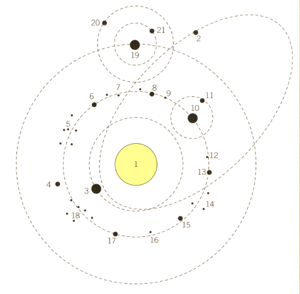The Earth's radius is slightly different if it is measured to the poles or to the equator. The distance from the centre of the Earth to the poles, the polar radius, is whereas the distance to the equator, the equatorial radius, is slightly larger at .
If the Earth were shrunk to a polar radius of , by how much would the equatorial radius be larger

Important Questions on Form
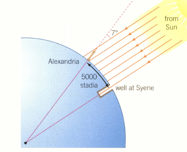
Eratosthenes calculated that the distance between Syene and Alexandria, represented the same fraction, of the Earth's circumference. Use your answer above to calculate Eratosthenes's circumference of the Earth (giving your answer in stadia).
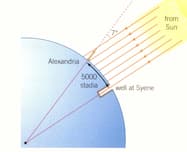
Eratosthenes calculated that the distance between Syene and Alexandria, represented the same fraction, of the Earth's circumference. Use your answer above to calculate Eratosthenes's circumference of the Earth (giving your answer in stadia).
If one stade is calculate the circumference of the Earth in meters.
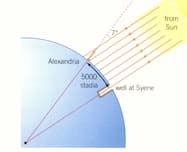
Eratosthenes calculated that the distance between Syene and Alexandria, represented the same fraction, of the Earth's circumference. Use your answer above to calculate Eratosthenes's circumference of the Earth (giving your answer in stadia).
If one stade is calculate the circumference of the Earth in meters. Compare this answer to the value that is currently accepted.
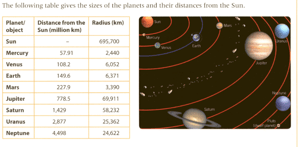
Consider the following questions.
Why is the Sun not drawn to scale in the picture above? Measure one planet and calculate how many times smaller it has been drawn. By applying the same scale factor, how big would the Sun have to be at that scale? How far away would it have to be?
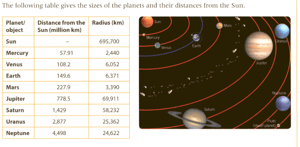
Consider the following questions.
Measure the size of the Sun in the picture and work out how far away the Earth would be on that scale. How far away would Neptune be? How big would the Earth be on this scale?
Planets that orbit other stars are being discovered frequently. Suppose you were to discover another solar system. A drawing of it is shown to the right. Identify which of these objects is most likely to be a star.
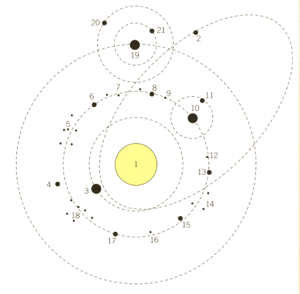
Planets that orbit other stars are being discovered frequently. Suppose you were to discover another solar system. A drawing of it is shown to the right. Identify which of these objects is most likely to be a planet?
